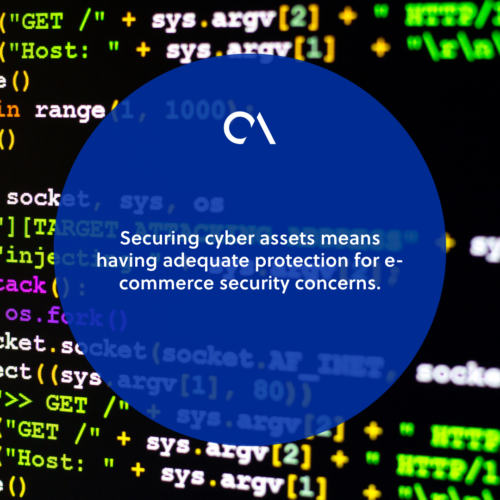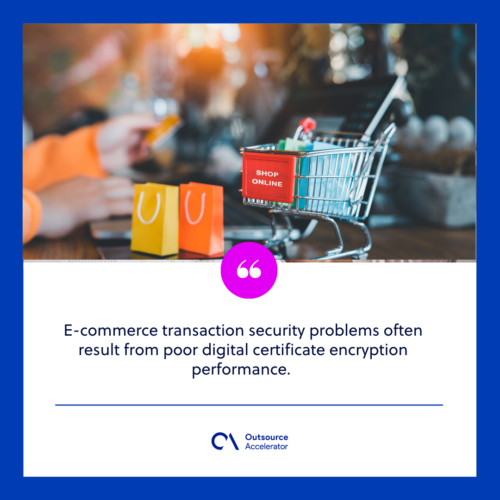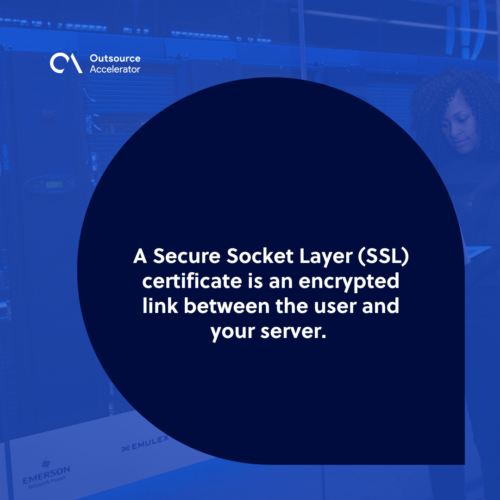8 most significant e-commerce security issues and how to avoid them

As organizations transition to the digital age, the danger of cyberattacks increases. This is because users frequently disregard good cyber hygiene.
A compromise in internet security may have significant consequences for both customers and organizations. As an e-commerce business owner, you only have one chance to get your e-commerce security right.
If your online business loses critical information due to e-commerce security concerns, you will almost certainly lose many potential clients.
For instance, clients would lose their trust in the company, and the business would gain a bad reputation.
Typically, hackers target e-commerce store administrators, users, and workers using various malware evasion techniques.
Securing cyber assets means having adequate protection for e-commerce security concerns.
This article will discuss the most prevalent e-commerce security issues and provide critical tips for avoiding these cyber attacks.

Basic e-commerce security
Building e-commerce security consists of protocols safeguarding people who engage in online transactions.
You must earn your client’s trust by implementing these e-commerce security basics:
Privacy
Privacy is the practice of restricting the sharing of consumer data with unauthorized third parties.
This means no one else should have access to a customer’s personal information or account data besides the online retailer they have chosen.
When sellers allow outsiders access to such information, a breach of confidentiality occurs.
E-commerce should implement anti-virus, firewall, encryption, and other data security measures.
Integrity
Another critical element in e-commerce security is integrity. The idea stipulates that the online business uses the information provided by the clients precisely as it is.
It entails ensuring that any information given by clients online remains unmodified.
So any change to the data leads the customer to lose trust in the business’s security and integrity.
Authentication
This concept of e-commerce security demands that both the supplier and the buyer be genuine. They should be who they claim to be.
The company should demonstrate that it is authentic, sells tangible goods or services, and has a legitimate claim about the products.
Clients should also provide evidence of identification for the seller to feel confident about online transactions.
Non-repudiation
Non-repudiation is a legal concept that urges participants in a transaction not to deny their acts.
This means that the company and the buyer must complete the deal they began and should finish the transaction as it is.
As a result, a party in that transaction cannot refuse a signature, email, or purchase.
8 e-commerce security issues
Building a well-rounded website is excellent, but your customer’s information could be vulnerable to hackers without proper security.
There are guidelines and best practices to follow to help ensure you’re doing everything you can to keep your online environment secure.
But first, let’s look at the most significant e-commerce security issues:
1. Malware and website hacking
Malicious hackers use malware to access users’ data on online shopping websites.
Malware and website hacking is dangerous. Malware can be a severe threat to your business and website.
Hackers use malware to steal user data from the client’s side or reroute them through sending malicious code or affiliate links, which will cost the owner of the website some loss.
Every online merchant should be aware of this advanced method of an e-commerce security issue and the risk of having their websites hacked.
2. Payment processing issues
The payment processing issue is a new e-commerce threat cybercriminals use.
Fraudulent merchants capture clients’ payment information through a gateway, while legitimate merchants implement payment processing correctly.
This issue also occurs when data is stolen or altered without the user’s knowledge which can later become identity theft.
3. Credit card skimming
Credit card skimming as an e-commerce security issue is a very dangerous activity affecting the financial and sensitive data of both businesses and clients.
Anyone who has ever handed a stranger their credit card knows how easy it is for a shop assistant to copy their essential information.
Because of this, malicious hackers can steal credit card details from online payment systems and even from ATMs by taking the receipts left by customers.
4. Third-party vendor issues
By storing payment information with a third-party vendor, businesses risk getting hacked. Hackers can infiltrate third-party websites or accounts.
They’ll be granted access to a website through the portal of one or more third parties.
For example, when an attacker breaks into an ad-serving service of your e-commerce site, the hacker now has access to the stats pages, cookie store, and all of the ads on your site.
5. Unauthorized employee access
Unauthorized access by certain employees can result in illegal purposes like reading emails, deleting data, and damaging or stealing information.
When unauthorized employees gain access to confidential files and personal accounts, they can make an unauthorized purchase on behalf of the company.
It also reveals that in most situations, the high risk associated with this e-commerce security issue is a financial loss.
6. Sensitive data exposure
Sensitive data exposure, also known as a data breach, can be very dangerous for data security and operations.
This happens when hackers gain access to a website’s databases and steal sensitive data, like credit card and Social Security information, for financial gain.
7. Insufficient transaction security
Insufficient transaction security occurs when thieves find ways to steal money through unauthorized transactions between accounts.
E-commerce transaction security problems often result from poor digital certificate encryption performance. This causes personal information leakage and digital certificate data modification attacks.

8. Lack of PCI compliance
The lack of PCI compliance can lead to neglecting IT security audits and prevent keeping data secure and safe.
The organization’s financial details and even a customer’s credit card details can be at risk when the system gets hacked without encryption.
Essential tips to avoid e-commerce security issues
E-commerce security is an important aspect of the online shopping experience.
For many businesses, adequate security measures are often a low priority that gets assigned to the bottom of their list of things to do.
However, if you’re aware of these issues, you can do what it takes to ensure you don’t fall victim to the latest scams.
So if you are thinking of setting up an online shop or an e-commerce website, here are some tips to avoid e-commerce security issues:
Use the latest web browser
Using an old browser version can make your e-commerce website vulnerable to hackers. So update your web browser whenever a new version is available.
Many free online services allow you to check for updates immediately. Remember to do it frequently, as running an outdated browser puts you at significant risk.
The newest version will have all the latest security fixes, which can prevent online attacks.
Always log out after shopping online
You can never be sure that someone isn’t watching the cookies on your browser and gaining access to your account.
There have been increased phishing attacks to steal customers’ credit card information and other personal information like passwords.
Various online forums have discussed the same thing, which is why we need to take an extra step to be sure that hackers are not using our login details.
One way of doing this is simply logging out of your account after shopping on e-commerce websites and never leaving your browser window open on non-secure sites.
Shop with reputable merchants
The web is full of shopping cart plugins. They all have extensions, features, and lots of information to make you buy.
But what makes you choose one over the other? It takes much more than just fancy features to help you make the right choice.
You should only shop with reputable merchants who adhere to the latest industry standards to provide an outstanding buying experience and security.
Investigate third-party providers
Investigate third-party providers because there’s no guarantee of their capabilities, efficiency, or quality yet, and you still need to know who they are.
This often means there is a chance of your data not being appropriately encrypted, which can result in security breaches.
If you have an e-commerce website, you must check out third-party websites and try to find any security issues.
Ensure your site has an SSL certificate
It’s necessary to use an SSL certificate for e-commerce websites or anywhere where there is a transaction involved.
A Secure Socket Layer (SSL) certificate is an encrypted link between the user and your server, and SSL monitoring checks for its validity.
The SSL security encrypts the data transferred from the server to the client and the data on your server.
This keeps your customer’s private information, such as their credit card number and address, from being stolen by hackers.
When encryption is applied to data in motion, such as through email or instant messaging, unauthorized parties can’t access it.

Only accept secure transactions
From attackers to bots, online criminals are always looking for cracks in your armor.
That’s why it is vital to offer your customers a safe environment when paying for purchases on your site.
A specific payment transaction allows the processor to encrypt sensitive customer data, such as account and card details while transmitting information to the bank.
Set up fraud alerts
Setting up fraud alerts is essential if you have a credit card or debit card online.
This will ensure that if someone tries to take a payment from your account without your permission, you’ll know about it immediately.
You can also set up alerts depending on how you buy something online. For example, if you’re purchasing goods from an individual, you can set up an alert for each item.
Avoid public Wi-Fi
Using public Wi-Fi is risky because most hackers use it to access private and personal data. It leaves you vulnerable to stolen sensitive information such as usernames, passwords, and credit card information.
If you are transacting to an online store, it would be best to use your mobile data or private Wi-Fi to ensure that you are keeping your information secure.
Only store the necessary information
It is important only to store the minimum amount of information required to complete your online purchase.
By keeping what you only need, you will have a little information on a page, making it difficult for hackers to extract information quickly.
Avoid these e-commerce security threats by following these tips
Any personal data you collect will be compromised at some point. But what matters most is how prepared you are to manage any cyber risks.
Being a wise e-commerce merchant means taking every precaution to keep yourself, your business, and your customers safe.
E-commerce merchants who know how to avoid ecommerce security threats can effectively secure their business, customers’ information, and products from cyberattacks.
Follow and adopt these essential tips; your e-commerce site should be secure enough to withstand serious cybersecurity threats.







 Independent
Independent




